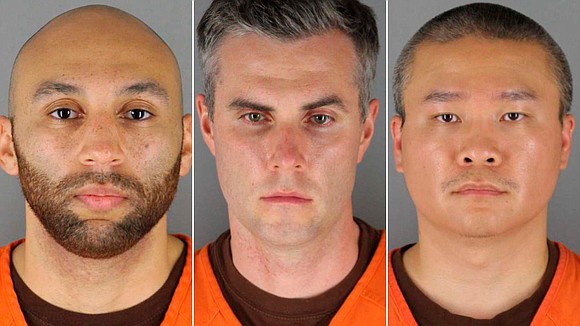State trial for three other ex-officers charged in George Floyd's killing is delayed until next year
CNN/Stylemagazine.com Newswire | 5/13/2021, 11:32 a.m.

By Eric Levenson and Brad Parks, CNN
(CNN) -- The state trial for the three former Minneapolis Police officers accused of aiding and abetting the murder of George Floyd has been postponed until March 7, 2022, so that a federal trial on civil rights charges can take place first, Hennepin County Judge Peter Cahill announced in a Thursday hearing, according to a pool reporter in court.
J. Alexander Kueng, 27, Thomas Lane, 38, and Tou Thao, 35, had been set to stand trial in August on charges of aiding and abetting second-degree murder and aiding and abetting second-degree manslaughter connected to Floyd's death last May. They have pleaded not guilty. Prosecutors have also appealed to reinstate a third-degree murder charge against them.
Derek Chauvin, the former officer who kneeled on Floyd's neck and back for more than nine minutes, was convicted last month of two counts of murder and one count of manslaughter. His sentencing is set for June 25.
During the fatal restraint, Kueng held down Floyd's torso, Lane held down his legs and Thao restricted bystanders from intervening, videos and testimony from that day show. All four former officers had initially been set to stand trial together, but Cahill ruled in January that Chauvin's trial would be held separately, citing limits on courtroom attendance due to Covid-19 precautions.
The latest decision to postpone the trial comes a week after a federal grand jury indicted all four former officers in connection with Floyd's death, alleging they violated his constitutional rights, according to court documents filed in federal court in Minnesota.
Thao and Kueng were indicted as defendants who "willfully failed to intervene to stop Defendant Chauvin's use of unreasonable force," the indictment said. Thao, Kueng and Lane are accused of "deliberate indifference to his serious medical needs," according to the indictment. The three ex-officers appeared with their attorneys in federal court Friday via video conference, and all three were released on $25,000 bond.
Separately, on Wednesday, Judge Peter Cahill ruled that Chauvin's crime had four aggravating factors, including that he committed it as a group with the active participation of at least three other people. Cahill wrote that Thao, Lane and Kueng were actively involved in the incident, but he made no finding as to their intent or knowledge.
Their roles in Floyd's death
The three ex-officers' actions on May 25, 2020, were shown in detail during Chauvin's trial in videos from bystanders, police body cameras and surveillance footage.
Lane and Kueng were the first responding officers on scene when the Cup Foods store called police about a man using a suspected fake $20 bill. The two officers then went to a vehicle with Floyd sitting in the driver's seat. Lane pulled out his firearm and pointed it at Floyd, yelling at the 46-year-old Black man to show his hands, according to their body camera footage.
Lane pulled Floyd from the vehicle and handcuffed him, and after a conversation on the sidewalk, the officers moved to put Floyd in the back of their squad car. Floyd resisted going inside the cramped vehicle, saying he was claustrophobic, and the officers physically struggled with him and tried to force him inside, the videos show.
Chauvin and Thao arrived in a separate squad car and tried to assist in getting Floyd into the vehicle. Chauvin then pulled Floyd from the vehicle and placed him on his stomach on the street, the videos show. He put his knees on Floyd's neck and back, while Kueng held down Floyd's torso and Lane held his legs.
Floyd stayed in that position, handcuffed and prone on the ground, for 9 minutes and 29 seconds, prosecutors said during Chauvin's trial, even as he repeated "I can't breathe" and called for his "mama." He eventually stopped breathing, passed out and lost his pulse.
While Chauvin, Kueng and Lane restrained Floyd, Thao stood nearby and blocked concerned bystanders from getting close, repeatedly raising his voice and arguing with them.
During the restraint, Lane is heard asking, "Should we roll him on his side?" and Chauvin responded, "No, staying put where we got him," according to body camera videos. Minutes later, Lane again said, "Want to roll him on his side?" the videos show. Kueng checked for Floyd's pulse but could not find one. The officers at no point moved Floyd into a side recovery position to help with his breathing.
All four officers were fired in the wake of the bystander video's release, and they were arrested and charged days later.
The officers' backgrounds
Both Kueng and Lane were rookie officers without much experience.
Kueng was hired as a police officer with the Minneapolis Police Department in December 2019. He had joined the department as a cadet in February 2019. He had no prior complaints. When Floyd's death took place, it was Kueng's third shift as a police officer, his attorney Thomas Plunkett said last year. Chauvin was Kueng's training officer, according to Plunkett.
Lane also joined the police department as a cadet in February 2019. He didn't have a history of complaints. He had been on the police force for four days when Floyd died, his attorney Earl Gray said last year. Lane was "doing everything he thought he was supposed to do as a four-day police officer," Gray said.
Thao had been a police officer with the Minneapolis Police Department since 2012. He had six complaints filed with internal affairs, one of which was still open, according to a Minneapolis Police Department internal affairs public summary. The other five were closed without discipline.







